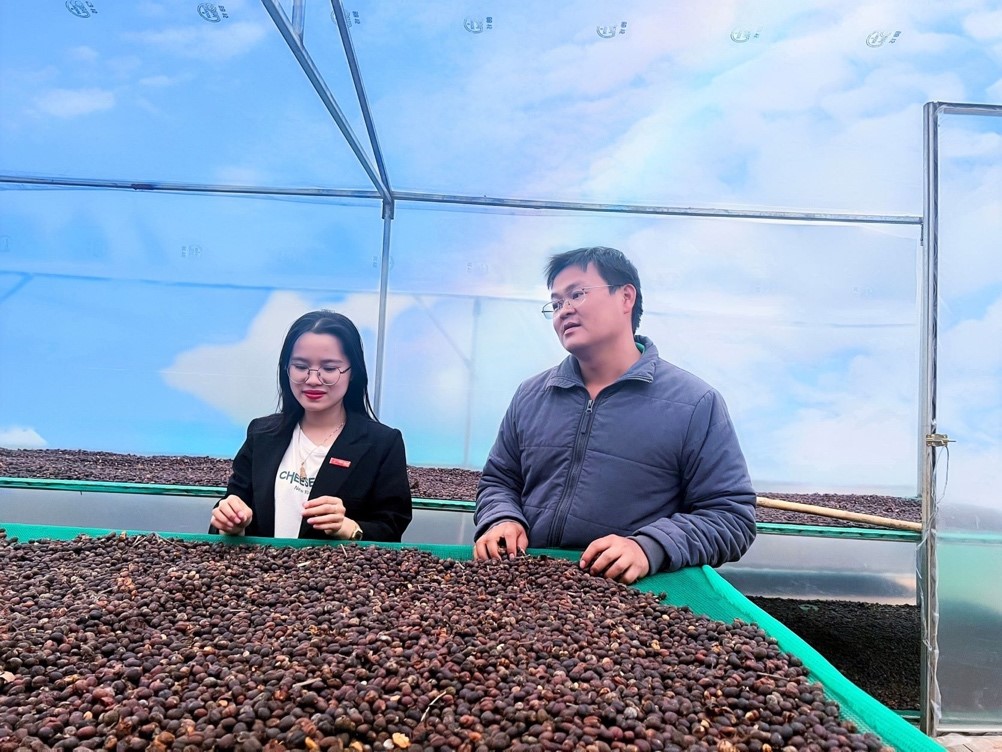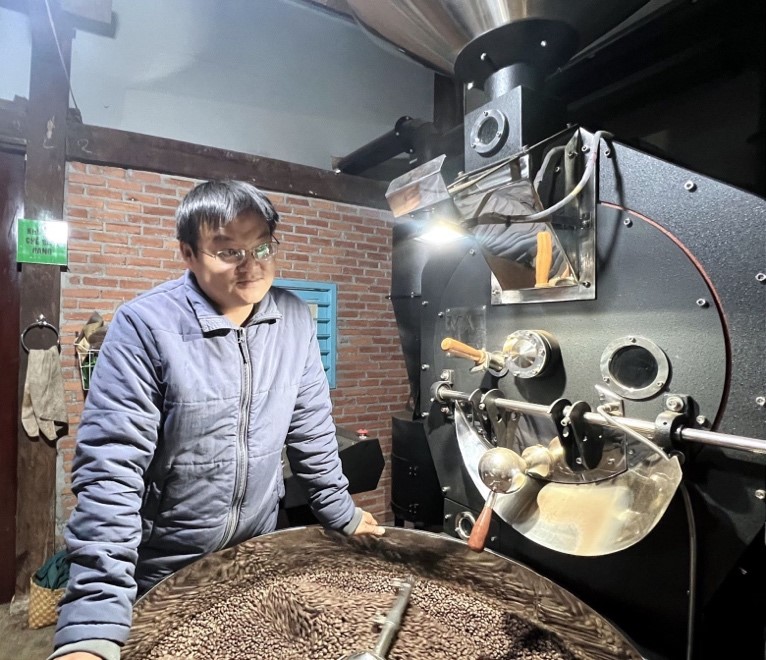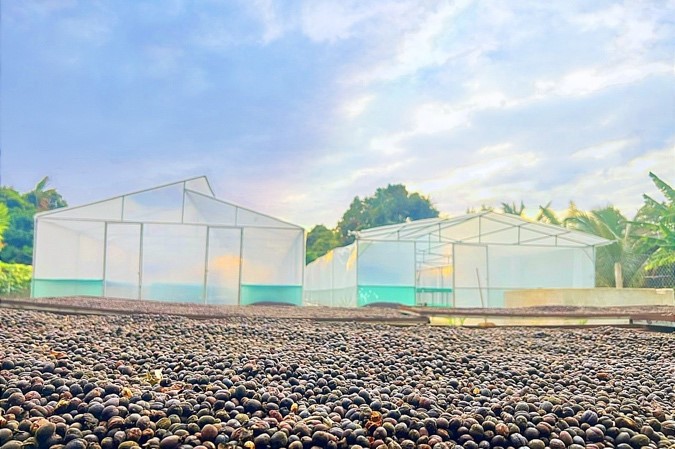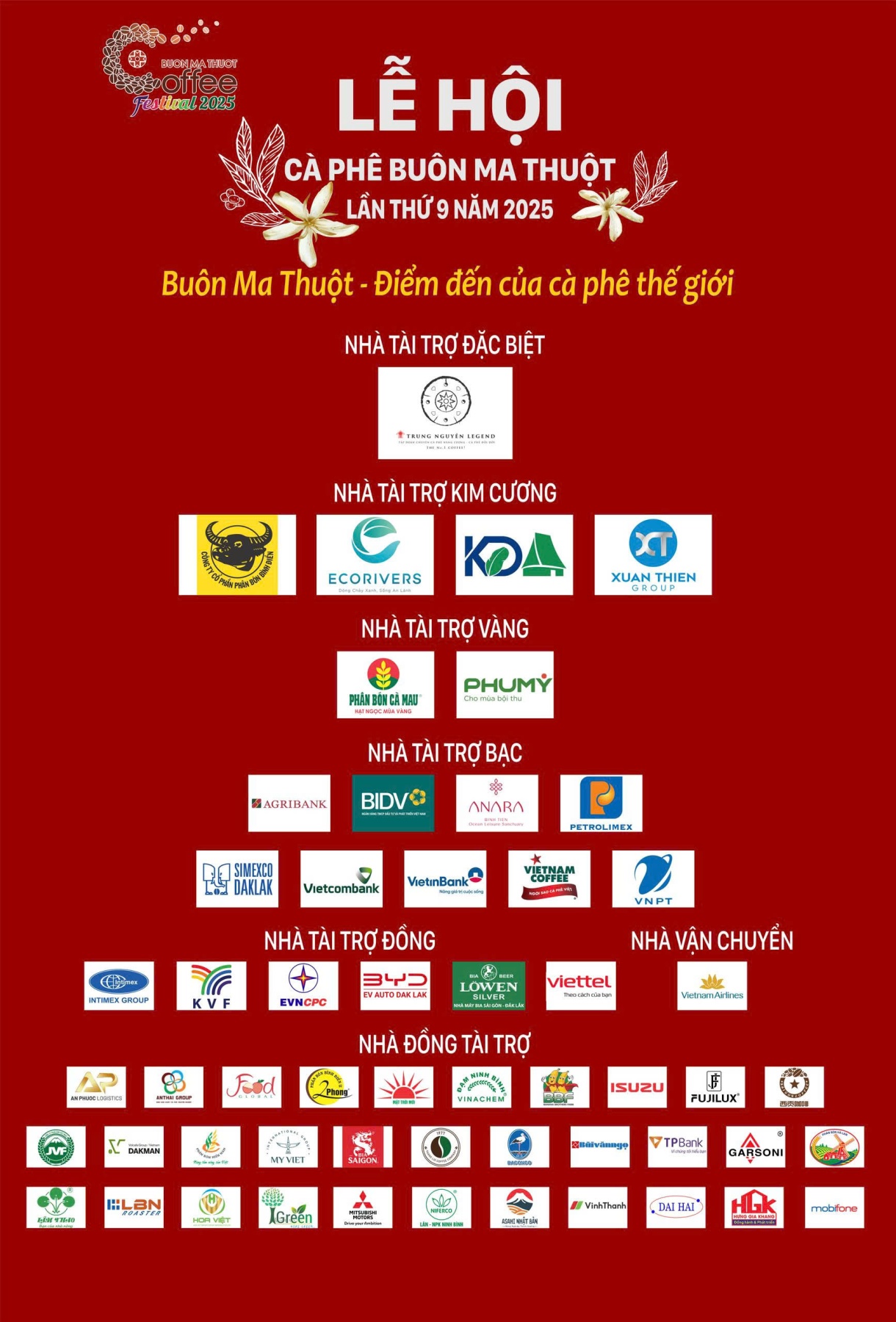VNHN Coffee is one of the agricultural products from industrial crops, accounting for a high proportion of annual production. The export of which yields high income for the country in general and the people of the Central Highlands in particular. It would be remiss not to mention coffee when we speak of the Central Highlands; the coffee tree is the soul and the source of life there. Coffee is not only of high economic value, but its growth also helps to green barren land and hills, and protect the ecological environment.
It can be said that coffee trees do not only bring economic values but also ecological cultural, humanity and environmental benefits. In the last days of February, as Buon Ma Thuot is urgently making preparations for the "8th Buon Ma Thuot Coffee Festival in 2023", the reporters had the opportunity to visit the family of Mr. Dang Van Huy, 35 years old, residing in hamlet 3, Cu Sue Commune, CuMgar District, to hear about the stories of the organic coffee beans and how he fulfilled his dream of building his own "organic farm”.

Mr. Dang Van Huy – Owner of “Dang Farm” Organic Farm and reporter
Reporter: Mr. Huy, please share with us your story of clean farming, specifically organic coffee. What are the reasons for you to persist with clean agriculture and to build yourself an "organic farm"?
Mr. Dang Van Huy – Owner of Dang Farm Organic Farm: I am a member of the Dao ethnicity, born and raised in a purely agricultural family. My family has been working with coffee for 4 generations. I can see that land is becoming increasingly arid and less fertile, productivity is decreasing and as a result, the price of coffee becomes volatile. In addition, there are unpredictable changes in climate and environment. We can clearly see the Ea Neh stream right behind my coffee fields (where I used to swim in); the water is getting depleted and soil is eroded. I can feel that the environment around me is gradually changing, the weather becomes more extreme, with more severe heat and drought. Therefore, I have been planning on clean agriculture, thus minimizing the impact on the environment.
At the beginning, in 2005, I traveled to many places to learn about how to realize clean agriculture. With my father’s sharing of how to start a business with coffee trees, and while revisiting previous material, I learned that for Robusta coffee, the method of natural planting and tending of the ancient Ede people will yield the highest quality coffee. So, I decided to experiment with 1 hectare of my family's coffee trees. I did not tend to this area much, and only watered it and pruned the branches. I also did not use chemical fertilizers, but let the grass grow naturally and then cut it so it fell to the root of the coffee trees. The branches, buds and leaves of these coffee trees were not cleaned up, but spread around. After a year, the yield of 1 hectare of this coffee was reduced to only about 1 ton, decreasing 3-4 times compared to the previous years.
Huy recalled: “At that time, in everyone's eyes, I was like a lunatic, doing nonsensical things. No one agreed with my way of working.”

Mr. Huy wishes to collaborate with companies and organizations to develop organic coffee, first to make it known to people, and then to facilitate its export. This will affirm the agricultural values of the Vietnamese coffee beans.
While working and gaining experience, since 2008, Huy has focused on fostering the development of organic coffee, expanding its production to an entire area of over 8 hectares. In order to improve the value of organic coffee beans, Huy focuses on harvesting nearly 100% ripe fruit, which lasts from 3-4 months. The harvested coffee is then preliminarily processed, washed and dried in a net house for natural fermentation, then roasted and ground. Each kilogram of coffee grown and processed with such exquisite techniques costs from 150,000 to 300,000 VND. Although the yield is only from 800 kg to 1.2 tons of kernels/hectare, with the profit of intercropping crops added and the costs subtracted, the total profit reaches about 100 million VND/ha and creates regular jobs for more than 20 people in the area.

According to Huy's calculations, if currently 1 hectare of re-cultivated coffee produces 4 tons of kernels, then 1 hectare of organically cultivated coffee only produces about 1.5 tons of kernels.
Reporter: Could you please tell us more about the organic coffee tending and production process? Regarding the product quality and output supply, what challenges did you encounter and what were the initial achievements?
Mr. Dang Van Huy: For natural coffee trees, without much tending, 1 coffee tree only yields 1-1.5kg of coffee beans. For the cultivation of coffee, Huy focuses on a multi-layer process, including the leaf layer, the canopy layer, the base layer where leaves and branches fall to the ground. When the first rain falls, it will automatically help this ground vegetation regenerate into an organic source of nutrients. Coffee will absorb this nutrient source to feed the plant. Apart from this, the coffee plants are only supported with foliar fertilizer, so that they have enough nutrients to grow. In addition, with the advantage of this multi-layer model, coffee trees can be prevented from exposure to extreme ultraviolet rays; this will make coffee beans more delicious.
“We cannot abuse pesticides and cause further harm to the environment. If we do not change our farming methods and continue to exploit and destroy nature, using substances harmful to the environment, in the future, our children and grandchildren will have to suffer. Therefore, I have to find a new way of doing things, come up with my own direction, and I’m happy with my choice." Dang Van Huy added.
After years of perseverance, with his efforts and enthusiasm, Huy also shared all the experience he gained with people in the area so that they could prosper together. Now, Huy and the people have been well-rewarded. Their coffee garden is growing much more robustly than before. Harvested coffee beans are now sold at a price 40% higher than conventional farming. According to Huy's calculations, if currently 1ha of re-cultivated coffee produces 4 tons of kernels, then 1ha of organically cultivated coffee only produces about 1.5 tons of kernels. However, the price of this organic coffee is many times higher than conventional coffee.
To seek distribution and consumption of his products, Huy, the owner of Dang Farm organic farm, participates in numerous events and exhibitions of organic agricultural products and promotes products on online channels, in addition to expanding distribution through coffee sellers, roasting companies, and organic coffee shops. Huy said that his farm's products are being frequently consumed in the province, but not in large quantities. In addition, he also focuses on online sales channels and expanding his markets. Therefore, Huy wishes to collaborate with companies and organizations to develop organic coffee, first to make it known to people, and then to facilitate its export, affirming the agricultural values of the Vietnamese coffee beans.
The price of organic coffee is many times higher than conventional coffee
“The 8th Buon Ma Thuot Coffee Festival in 2023 will take place from March 10 to 14. With thorough preparation and a program of many special and engaging activities, I expect this year's Festival to be a great success, attracting many investors and consumers from Viet Nam and all over the world. They will know about the value of our province’s coffee, and this will promote the organic coffee industry in particular and the whole coffee market in general, so that the industry can become more professional and our coffee more valuable. This will enable our people to engage in socio-economic development. In addition, the Festival will elevate the province's tourism industry to new heights”. Dang Van Huy siad.
Reporter: Thank you very much. I wish you good health!
Vo Ha - Mai Trinh
- Buon Ma Thuot Coffee Festival leaves a deep impression on visitors (14/03/2025, 15:50)
- 250 thousand visitors attended the 9th Buon Ma Thuot Coffee Festival (14/03/2025, 15:35)
- Colourful street festival highlights Buon Ma Thuot coffee culture (13/03/2025, 14:44)
- Conference looks to boost global standing of Vietnamese coffee (13/03/2025, 14:37)
- International Trade Conference in Dak Lak looks to boost global standing of Vietnamese coffee (13/03/2025, 14:32)
- Changing Profile Frames to Commemorate the 50th Anniversary of the Buon Ma Thuot Victory (March 10, 1975 - March 10, 2025) and the 9th Buon Ma Thuot Coffee Festival in 2025 (08/03/2025, 22:59)
- Young People Eagerly Anticipate the Light Festival at the 2025 Buon Ma Thuot Coffee Festival (08/03/2025, 22:51)
- Buon Don Elephant Festival: A Unique Highlight of the 9th Buon Ma Thuot Coffee Festival (08/03/2025, 22:02)
- Digital Content Creation Competition for the Coffee Festival: Special Award for “Coffee - The Foundation of Dreams” (08/03/2025, 06:26)
- Dak Lak Proposes Live Broadcasts for the 50th Anniversary of the Buon Ma Thuot Victory and the 9th Buon Ma Thuot Coffee Festival (08/03/2025, 06:08)
- Dak Lak Introduces Two New Activities for the Buon Ma Thuot Coffee Festival (07/03/2025, 17:15)





